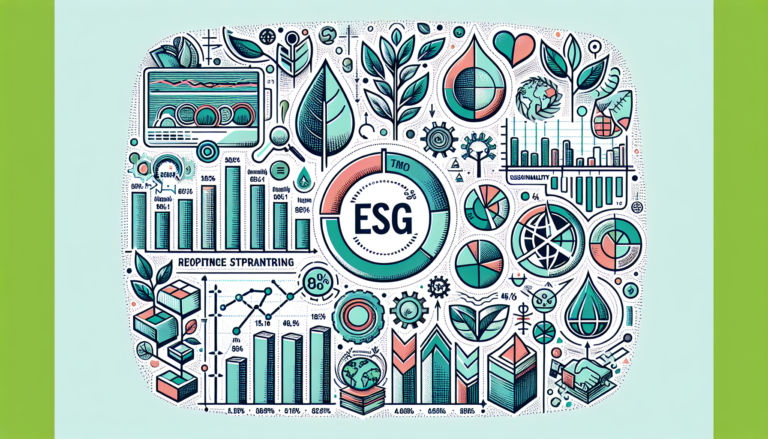Explore the top sustainable investment options in ESG funds
ESG funds list provides a selection of investment options that prioritize environmental, social, and governance criteria, allowing investors to align their portfolios with ethical practices while pursuing financial growth.
When it comes to investing, focusing on sustainability is crucial. The esg funds list offers a window into ethical investment opportunities that align with socially responsible practices. Curious about how these funds can impact your portfolio?
What are ESG funds?
ESG funds are investment vehicles that prioritize environmental, social, and governance factors in their selection of assets. Investors in these funds aim to align their portfolios with their ethical values while seeking to achieve competitive financial returns.
These funds typically invest in companies that demonstrate strong practices regarding sustainability, labor rights, and corporate ethics. For instance, an ESG fund may focus on firms that reduce their carbon footprint or promote diversity and inclusion.
What Makes ESG Funds Unique?
Unlike traditional investments, ESG funds evaluate potential investment opportunities based on a broader range of criteria. This includes assessing a company’s impact on the environment, how it treats its employees, and the transparency of its governance practices.
Investment Strategies in ESG Funds
There are various strategies that ESG funds may employ, including negative screening, which excludes companies involved in harmful practices, and positive screening, which seeks out businesses that make a positive social impact. These strategies help investors make more informed choices about where to allocate their capital.
The Growth of ESG Investing
In recent years, ESG investing has gained significant traction, attracting a diverse range of investors. As awareness of sustainability issues increases, more funds are being created with a focus on ethical investing. This trend reflects a growing recognition that sustainable business practices are not only beneficial for society but are increasingly linked to long-term financial performance.
Benefits of investing in ESG funds
Investing in ESG funds offers numerous advantages for individuals looking to make a positive impact while seeking financial returns. One of the primary benefits is the alignment of investments with personal values. Many investors prefer to support companies that prioritize sustainability and ethical practices.
Another significant advantage is the potential for financial performance. Research has shown that companies with strong ESG practices often perform better in the long run. This is because these companies are typically better at managing risks and adapting to changing regulations and consumer preferences.
Risk Mitigation
Investing in ESG funds can help mitigate risks associated with poor corporate governance, environmental violations, and social controversies. Companies that manage these factors effectively are less likely to face legal challenges or reputational damage, which can protect investors’ capital.
Attracting a Broader Investor Base
As consumer and investor preferences shift towards more sustainable practices, companies that focus on ESG principles may attract a broader base of investors. This trend can improve stock performance and enhance company resilience during economic downturns.
Positive Social Impact
Investing in ESG funds allows individuals to contribute to social and environmental causes. By channeling funds into companies that prioritize sustainability and ethical practices, investors can help promote social equity, environmental conservation, and community well-being.
In summary, the benefits of investing in ESG funds extend beyond potential financial returns. These funds provide an opportunity to invest in a way that aligns with personal values while supporting a more sustainable future.
Key features of the best ESG funds
The best ESG funds share several key features that make them attractive to investors. These features help ensure that the funds not only focus on financial return but also on sustainability and ethical practices.
Thorough ESG Criteria
The top ESG funds utilize comprehensive screening processes that evaluate companies based on environmental, social, and governance metrics. This helps to ensure that investments are aligned with sustainable and responsible practices.
Active Management
Many leading ESG funds employ active management strategies to adapt to changing market conditions and stakeholder concerns. This approach allows fund managers to respond quickly to new information and trends, maximizing the potential for returns while maintaining ethical standards.
Transparency in Reporting
Transparency is a vital feature of successful ESG funds. Investors can access detailed reports outlining the fund’s holdings, performance, and adherence to ESG criteria. This openness builds trust and helps investors make informed decisions.
Focus on Long-Term Growth
Quality ESG funds prioritize long-term growth rather than short-term gains. They invest in companies that are committed to sustainable practices, which can lead to better performance and resilience over time.
Diversity of Holdings
The best ESG funds typically hold a diverse range of assets across various sectors. This diversification reduces risks and enhances the potential for returns while aligning with broader social goals.
How to choose the right ESG fund
Choosing the right ESG fund involves careful consideration of several important factors. Understanding these factors can help investors align their portfolios with their values while maximizing returns.
Identify Personal Values
The first step is to identify what values matter most to you. Are you passionate about environmental issues, social justice, or corporate governance? Knowing your priorities will help narrow down your options.
Research ESG Criteria
Different funds use various criteria to evaluate investment opportunities. Review the specific ESG criteria that each fund employs. Consider how these criteria align with your personal values and whether they are rigorous enough to ensure meaningful investments.
Assess Fund Performance
Look at the fund’s historical performance to gain insight into its returns. While past performance is not a guarantee of future results, consistent returns can indicate good management and smart investment strategies.
Understand Fees and Expenses
Pay attention to the fees associated with each fund. Higher fees can eat into your returns over time. Compare expense ratios and any other associated costs to ensure you are not overpaying for management services.
Check for Transparency
Choose funds that offer transparency in reporting and operations. Look for funds that provide regular updates on their holdings, performance, and adherence to ESG principles. Transparency builds trust and confidence in your investment choices.
Diversity of Investments
A well-diversified fund can help mitigate risks. Review the fund’s holding to ensure it includes a variety of sectors and industries. This diversity can enhance stability and reduce the potential impact of fluctuations in specific markets.
Performance comparison of popular ESG funds
When considering ESG funds, it’s crucial to compare their performance to make informed investment decisions. These comparisons help investors assess which funds align best with their financial goals while adhering to ethical standards.
Understanding Performance Metrics
Performance can be evaluated using several metrics, including total return, risk-adjusted return, and volatility. Investors should look for funds that provide consistent returns over time while managing risks effectively.
Historical Performance of Top ESG Funds
Many popular ESG funds have demonstrated strong historical performance. For example, some funds have outperformed their traditional counterparts by focusing on sustainable business practices, which can lead to more resilient growth.
Comparative Analysis
To perform a fair comparison, investors should analyze a variety of ESG funds across different sectors. This can include looking at funds that invest primarily in technology versus those in renewable energy. Each sector’s dynamics can greatly influence performance.
Expense Ratios and Fees
Don’t forget to consider the expense ratios of the funds. High fees can significantly affect net returns, so comparing costs alongside performance is essential. A lower expense ratio combined with solid performance may indicate a better overall investment.
Consideration of ESG Ratings
ESG ratings can also provide insights into fund performance. Funds with higher ESG ratings generally invest in companies that are deemed more sustainable and ethically aligned, which may correlate with better performance over time.
Future trends in ESG investing
The future of ESG investing looks bright as more investors prioritize sustainability and corporate ethics. Several trends are emerging that will shape the landscape of ESG investments in the coming years.
Increasing Regulation
Governments around the world are implementing stricter regulations regarding corporate responsibility and sustainability. This might lead to increased demand for ESG investments, as companies strive to comply with new standards.
Focus on Data and Analytics
Investors are using advanced data analytics to evaluate the ESG performance of companies. This trend will continue to grow, as improved data will help investors make informed decisions about sustainability and social impact.
Integration of ESG Factors into Financial Analysis
More financial analysts are recognizing the importance of ESG factors in their evaluations. This integration means that ESG performance will now be considered a critical part of a company’s risk assessment and overall financial health.
Growth of Thematic Funds
Thematic ESG funds focusing on specific issues like renewable energy, gender equality, or clean water are gaining popularity. These funds allow investors to align their portfolios with particular causes that they care about.
Increased Engagement with Companies
Investors are becoming more engaged with the companies they invest in, advocating for better ESG practices. Shareholder activism will likely increase, encouraging companies to adopt more sustainable and ethical practices.
Youth Investment Trends
As younger generations enter the investment world, they are prioritizing sustainability in their investment choices. This demographic shift will further drive demand for ESG funds and influence how companies approach ESG issues.
Wrapping Up: The Future of ESG Investing
In conclusion, ESG investing is not just a trend; it is becoming a key component of modern investment strategies. As more people prioritize sustainability and ethics in their financial decisions, the demand for ESG funds will continue to grow.
Understanding the key features of these funds, their benefits, and the future trends shaping the market will empower investors to make informed choices. Whether you are new to investing or looking to align your portfolio with your values, embracing ESG principles can lead to positive change.
By staying informed and engaged, you can play a part in promoting sustainable practices and making a difference in the world.
Frequently Asked Questions
What are ESG funds?
ESG funds are investment vehicles that consider environmental, social, and governance factors when selecting companies to invest in. They aim to support sustainable and ethical business practices.
How do I choose the right ESG fund?
Choosing the right ESG fund involves identifying your personal values, researching the fund’s criteria, assessing its performance, and comparing fees.
What benefits do ESG funds offer to investors?
Investors in ESG funds can align their investments with their values, potentially achieve strong financial returns, and support positive social and environmental outcomes.
What trends are shaping the future of ESG investing?
Key trends include increasing regulation, reliance on data analytics, greater focus on transparency, and the rise of thematic funds that focus on specific environmental or social issues.
How does shareholder activism impact ESG investing?
Shareholder activism encourages companies to improve their ESG practices by pushing for better sustainability and governance, which can lead to more responsible business behavior.
Why is youth involvement important in ESG investing?
Younger generations prioritize sustainability in their investment choices, and their involvement will drive demand for ESG funds and influence corporate practices.






